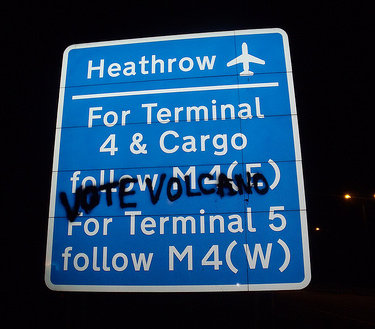
I'm writing this on day three of a two-week journey from Europe back to the United States. We had lunch with the captain (mushroom soup, salad, Sri Lankan curry), enjoyed the sun on the upper deck, and returned to our room, me on my laptop, Barnali curled up with a copy of The Girl Who Kicked the Hornet's Nest, quietly humming a song. Who knew that time aboard a container ship could feel like such a luxurious experience? This is what slow travel feels like. And it's one of a wide range of responses to the fact that aviation as we know it is dangerously unsustainable.
Our flight-free trip was inspired in large part by work being done in the UK. The British environmental and policy community have managed to inject the issue of the massive climate impacts of aviation* into the general public discussion, to the point where it's a matter of mainstream political and ethical debate. We wanted to know more.
But then something amazing happened right before we arrived in London.
Against all odds, the British climate/aviation community won the Battle of Heathrow.
For the past decade, a grassroots coalition has been fighting a planned major expansion of Heathrow Airport, which, if completed, would have busted Britain's national carbon budget. It was a classic David vs. Goliath fight. On one side were resident groups, environmental NGOs, green direct action groups, and everyday concerned citizens. On the other, the Labor government, airport authorities, business groups, and airlines.
How did the Davids alter the course of public and business debate? How did neighbors and environmentalists convince a Conservative Prime Minister to take on the aviation Goliaths, and permanently halt plans to build a 3rd runway at Heathrow? We did about a dozen interviews to uncover this story, and that of the various movements taking on the massive climate impacts of aviation.
We'll be posting the stories in about six parts over the coming weeks. We left London feeling incredibly inspired; we hope you'll be as well.
At home, we feel like the only ones we know talking about this issue. There was such a tremendous sense of relief being in a place where these questions are part of mainstream policy discussions. We're not crazy, we'd tell ourselves. A majority of Britons support curbing aviation growth. They've figured out something very important here, and more people need to know.
* The facts are clear. Flying is responsible for about 5% of human impact on the climate -- and at current rates, emissions will quadruple by 2050. But flying remains an elite activity; roughly 95% of the people on the planet have never flown. There's no debate on the scale of the impacts; the aviation industry acknowledges them as well, and even recommends trains on their own website.
Leave a comment